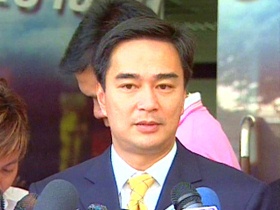Calls for increased local funding, universities, at Jomtien seminar
Despite objections from power-conscious politicians and bureaucrats, Prime Minister Abhisit Vejjajiva said he plans to push through a government-decentralization proposal that would see increases in local funding and education.
Speaking at the “Decentralization and Strengthening of Local Self-Governance” seminar at Jomtien Beach’s Ambassador City Hotel Dec. 18, the prime minister said he wants local budgets increased by 35 percent and proposed a “one province, one university” project to not only relieve crowding in Bangkok colleges, but boost research and knowledge in all of Thailand’s 77 provinces.
 Prime Minister Abhisit Vejjajiva talks about how decentralization is ‘essential’ in solving Thailand’s problems.
Prime Minister Abhisit Vejjajiva talks about how decentralization is ‘essential’ in solving Thailand’s problems.
Abhisit called decentralization of power “essential” in solving the nation’s problems. It’s a view not shared by all, especially those with vested interest in keeping power locked up in the capital. But the premier said that despite objections, he plans to push his proposal through.
“We need to think about the next step being a giant leap forward for the organization of local government to have a role and be truly strong,” he said.
The central government, he said, cannot solve every problem by itself. A prime example of that, he said, is the environmental crisis arising from the Maptaput industrial complex, where residents last year won a legal bid to shut down 67 pollution-causing projects until the government improved water quality, installed air pollution monitoring stations and tightened regulations on hazardous materials.
Solving issues like Maptaput, Abhisit said, requires coordination from both central and local governments. Neither side has the ability to solve such issues alone.
What’s really needed, he said, is more expertise at the local level. While Thailand does have universities sprinkled around the country, the best schools and the leading researchers are only in Bangkok. That needs to change, Abhisit maintains.
The idea of “one province, one university” would put institutions of higher education in each of the 76 provinces, many of which currently don’t have one. “Local research can help solve problems, such as public debt issues and narcotics,” Abhisit said.




